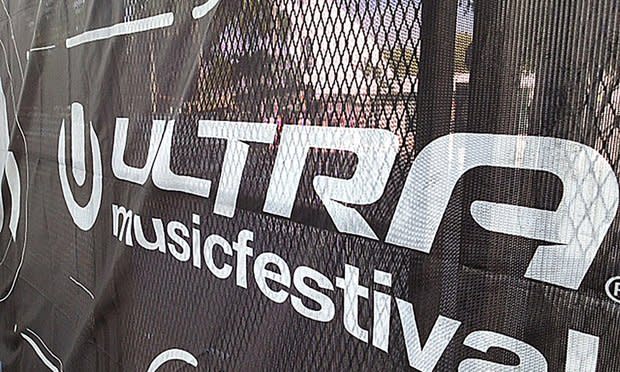No Peace and Love: Miami Music Festival Organizers Clash in Federal Court

Ultra Music Festival 2013. Photo: John Michael Rindo
Miami's most well-known music festival has been accused of collaborating with the city to stamp out any possible competition.
Ultra Music Festival's parent companies, Ultra Enterprises Inc. and Event Entertainment Group Inc. are defendants in a federal lawsuit filed Friday in the Southern District of Florida.
The five-count complaint by plaintiff Rapture Electronic Music Festival against the companies also lists Miami and the Virginia Key Beach Trust as respondents. It alleges they conspired to undermine Rapture's event, and establish a monopoly over the city's music festival market.
The Rapture event had been scheduled to take place on Virginia Key on the same days in March as the Ultra festival. It had been scheduled for the beachside park during Miami Music Week for its 2017 and 2018 iterations. However, the Miami City Commission voted in November to approve Ultra's move to Virginia Key for March 29-31 after kicking the long-running festival from its Bayfront Park home in September.
The suit accuses the parties of attempted monopolization and conspiracy to monopolize. Ultra Enterprises and Event Entertainment Group are singled out for engaging in tortious interference against Rapture, which is described in the complaint as "a competitor and alternative to Ultra festival." Rapture is also seeking an injunction against Ultra to prevent its 2019 event from taking place.
'Back-Door Deal'
Rapture’s lawyer Paul Silverberg told the DBR the battle for Virginia Key "is a move by Ultra to be the only music festival" in Miami.
"Regardless of what Ultra says, you can tell by their actions that this was a backdoor deal struck to put Rapture out of business," the Weston-based attorney said. "And there’s clearly ulterior gains for the city that aren’t disclosed."
Read the complaint:
According to Silverberg, officials dismissed concerns over Rapture's application to use Virginia Key on March 29 and 30.
"The rules for the special event application process is 'first come, first serve,'" Silverberg said. "Rapture submitted its application prior to Ultra. We never heard that it was approved, rejected or withdrawn. The city is sitting on its deposit. They then took Ultra’s application and approved it. What could be the possible explanation?"
Silverberg also claimed Ultra has an outsized ability to control market prices and city officials, due to its status as an international entity.
"Rapture is a local festival; Ultra is around the world. If you do lighting, you do food, you do beverage, where do you want to be in March?" Silverberg said, adding Ultra has a "huge effect on the local, international and national economy."
"You can basically have your own month and have no competition for DJs, no competition for vendors," he added. "That’s a really strong hold."
Requests for comment from the Virginia Key Beach Trust and Miami City Attorney Victoria Mendez were not returned by press time.
Ultra said in a statement dated Feb. 4 that "there is no merit to the recent lawsuit."
"To claim that Ultra has violated the law is both disappointing and misplaced," the statement read. "Ultra lawfully secured its license to host its annual production on Virginia Key, including by obtaining necessary approvals from the City of Miami Commission."
Festival organizers reasserted their intention to hold their concerts at Virginia Key in March and offer fans "the best and most transformative music festival that we have ever produced."
Ultra’s general counsel, Sandy York, declined to offer comment beyond the company's statement.
Related stories:
Ultra Music Festival Licensor Wins Appeal Against Co-Founder's Brother
Ultra Music Festival Litigation Shows No Sign of Stopping Despite Verdicts in Federal Court
Big Law Partner Saves the Music by Relocating Iconic Miami Festival



